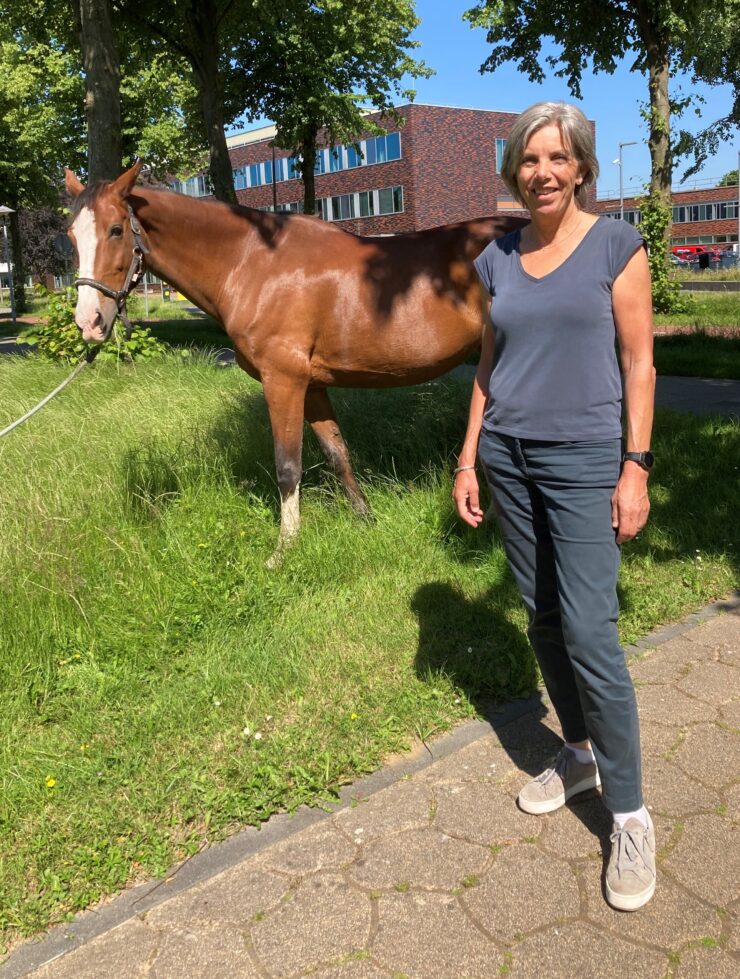Coffee to go with...
Nicole Mastenbroek: I explain to students that it is normal to make mistakes during the learning process
In this TAUU column ‘Coffee to go with’ I go out with UU teachers in the beautiful nature around the Utrecht Science Park. While walking I ask UU teachers about their work and passion.
Lecturer: Nicole Mastenbroek. Date: June 16, 2022. Drink: Cappucino. Weather: 23 degrees, almost no wind, lovely sunshine.

Since when do you work at UU?
Since 2007. Before that, I worked as an agricultural veterinarian for almost 20 years. I was co-owner of a large group practice. In 2002, out of curiosity, I took a course in personnel psychology and later a course in developmental psychology. I found that super interesting, left the practice in 2005 and completed a bachelor’s and master’s degree in labor and organizational psychology. What intrigued me was the following: being a veterinarian is a wonderful profession, something that captures the imagination of many and it is something that many people dream of becoming from an early age. Yet I noticed that the enthusiasm among veterinarians in the field, and also myself, was not always so high and I wondered why this was the case. In 2014, I received my PhD on work engagement. My PhD research focused on the relationship between personal characteristics, characteristics of the work and the level of engagement experienced by veterinarians. I now combine doing research with my work as tutor coordinator, student welfare advisor and teacher of personal and professional development & professional conduct. Together with Marijntje Zeijen, Veerle Brenninkmeijer and Maria Peeters we are doing research on the relationship between the extremely high demands that students put on themselves and the occurrence of study stress and burnout in master’s students.
What do you think a tutor can do for a student with very high ‘personal demands’ such as irrational high expectations of themselves?
As a teacher or tutor you can help a student to become aware of e.g. the tendency to think that everything must be perfect right away, and the effects this has on their wellbeing and therefore on their learning. You can explain that the student is not alone in this and help them to overcome something by taking small steps. I often explain that it is normal to make mistakes in the learning process as well. A concrete example is when a student is afraid of doing something wrong, e.g. pricking an animal in the presence of the owner, then you can help as a teacher by taking this seriously and, for example, first let the student practice pricking without the owner being present. If a student suffers from fear of failure, you can also point out the possibility of extra support through a fear of failure training or an appointment with a student psychologist.
What is the most special moment that you have experienced with a student or group of students?
There are many great moments. As a tutor, I always find it very special to be able to see how a student develops. As a tutor you can really make a difference and sometimes you don’t even notice it yourself, but afterwards you hear it from the student. But even apart from tutoring, it is wonderful to be able to walk with them and see how they ‘grow’. I also love talking to students about what they find important in life, what drives them, how they go about achieving this and who their role models are.
What do you like to do in your free time?
Rowing, cycling, yoga, pilates, taking (long distance) walks, reading about social developments and playing the piano (classical) – my favorite composer is Schubert.
If you could change one thing within UU to strengthen you as a teacher, what would it be?
More money to education! In which I would like to see de-stressing, both in students and teachers. It would be wonderful if more time could be freed up for students to develop personally. You can take the course and become competent in your profession as a veterinarian, but in order to feel that way, time and attention to personal development is at least as important. For the teacher, there should also be more time for teaching, training and mutual exchange, and more time for conversations with students, this creates mutual inspiration and greater well-being. Increasing student welfare is really something of the long haul, we can take many small steps that give a long-term effect in the right direction. A good example is the establishment of the taskforce student wellbeing, (of the UU, but recently also at the Faculty of Veterinary Medicine) consisting of both students and employees, to think along and especially to develop initiatives to improve the welfare of students and employees.
What tip would you like to give fellow teachers?
To support students in their personal and professional development, it is often sufficient to be there for your students with full attention, not only as a professional but also as a human being, and to ‘give yourself’.
 27 June 2022
27 June 2022
If you want to comment, please login on the left side of the page with your UU account..


